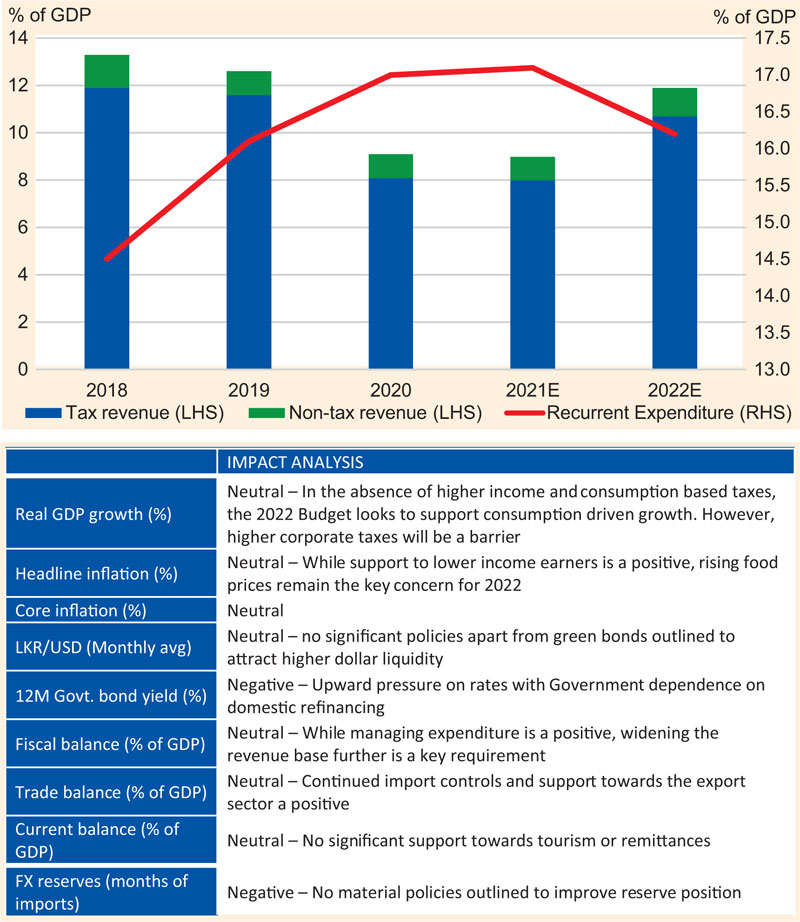Friday Feb 27, 2026
Friday Feb 27, 2026
Monday, 15 November 2021 00:30 - - {{hitsCtrl.values.hits}}
By Asia Securities Research
|
Finance Minister Basil Rajapaksa
|
The incumbent Government set out the path for reviving the post-COVID-19 economy in its 2022 National Budget this week. Faced with challenges of COVID-19 relief efforts, a gradual economic recovery hit by sporadic travel restrictions and decline in tax revenue, the new budget proposals take a medium-term view by focusing on stability, while increasing tax revenue in the near-term through one-off taxes targeting corporates that generated over Rs. 2 b profits before tax in 2020/2021.
In the near term, the Budget aims at generating a consumer led economic recovery post COVID-19. A key highlight was the Government’s efforts to ensure minimal changes to the existing tax structure, notably consumption focused taxes, thereby ensuring lower impact on spending power.
The Government looks to bridging the deficit completely through domestic financing. While this will reduce external debt, the method of financing is key, in our view. If the government resorts to money printing, this policy measure will see upward pressure inflation; in addition to the existing pressure from rising food inflation.
As an offshoot of the domestic financing target, we expect upward pressure on interest rates in 2022.
Another key feature is the focus on lowering expenditure towards State-Owned Enterprises while increasing accountability of spending by these institutions. We believe this is a step in the right direction to lower part of the Government’s recurring expenditure. Overall, the Government looks to reduce its recurrent expenditure sharply in 2022, a relatively ambitious target against the current backdrop.
While we perceive the broad tax base remaining largely unchanged to be a positive, our concern is on the Government’s revenue collections in 2022, where the country gradually recovers from the impact of COVID-19. The rising cost of living owing to 1) escalating global commodity prices and 2) lower supply due to chemical fertiliser shortages is an added burden to consumers and farmers at this juncture.
While the Government forecasts revenue at ~12.3% of GDP (9.5% of GDP in 2021) driven by a 40.6% YoY growth in revenue collections, we expect this to be ~11.0% of GDP based on the lower-than-expected increase in the revenue base. At this point, we emphasise the need for a clearer outline of the Government’s revenue collection plans to meet this ambitious target.
We expect Government expenditure to reach 21.5% of GDP (against the Government’s forecast of 21.1% of GDP). Our overall fiscal deficit forecast comes to 10.5% of GDP. We forecast GDP growth of ~5.1% YoY for 2022.
An interesting point was the Government’s plans to introduce green bond financing as a potential US Dollar inflow. If successful, this could be a potential dollar inflow avenue given the challenges faced to go to international markets at this juncture
Equities – Immediate one-off impact in the near term; focus on medium-term stability
Asia Securities sees the impact of the 2022 Budget as being neutral on equities in the near-term, although a one-off impact to counters affected by the tax policies may be seen.
Overall, we see the Budget proposals made in positive light for majority of the sectors, including manufacturing, textile fabric, construction, healthcare, and renewable energy On the other hand, sectors such as banking and non-bank finance institutions would see an impact from the 2022 Budget proposals.
We see the proposed ‘Social Security Contribution’ at 2.5% on annual threshold turnover exceeding Rs. 120 m affecting the majority of the listed counters and in effect brings back a similar tax to NBT. However, as this would be a pass-through tax, it is our view that corporates will take measures to pass this cost down to the end customers. However, in some cases this may not be entirely passed down amidst rising inflation and reducing buying power, and in sectors where demand is elastic.
One-time taxes proposed on highly profitable companies and the banking and finance sectors will have a near term impact to profitability. The most notable impact at a corporate level comes from a one-time 25.0% tax surcharge proposed to be imposed on persons or companies with a taxable income of over Rs. 2,000 m. It should be noted however, that while this will see to a one-off impact to profits at the end of the financial/calendar year, the operating environment for affected counters remains unchanged. The downside we see here is the likely pullback on dividend payouts over rest of the ongoing financial year until the one-off tax is accounted for
We expect to see investors factoring in the impact of the one-off taxes on the profitable companies to FY22E/CY21E valuations, and as such, likely to see a pullback in some of the affected counters. Furthermore, the impact will be focused on index heavy sectors such as banking, NBFI, manufacturing and conglomerates. However, Asia Securities believes that the banking and NBFI valuations have already been at a significant discount and does not warrant a further decline.
In the near term, with high single digit inflation expected to continue through the rest of 2021 and into early 2022 and interest rates expected to be maintained to promote growth, we believe equity markets will remain the preferred asset class. However, in the medium term, particularly heading into 2H 2022, we see the case for interest rates to pick up, which could impact equities negatively in the medium to long term.


(Asia Securities is a leading investment firm in Sri Lanka providing investment banking, research, equities and wealth management services to local and international corporate, institutional and individual clients. To become a client of Asia Securities, reach out via [email protected] or visit www.asiasecurities.lk.)